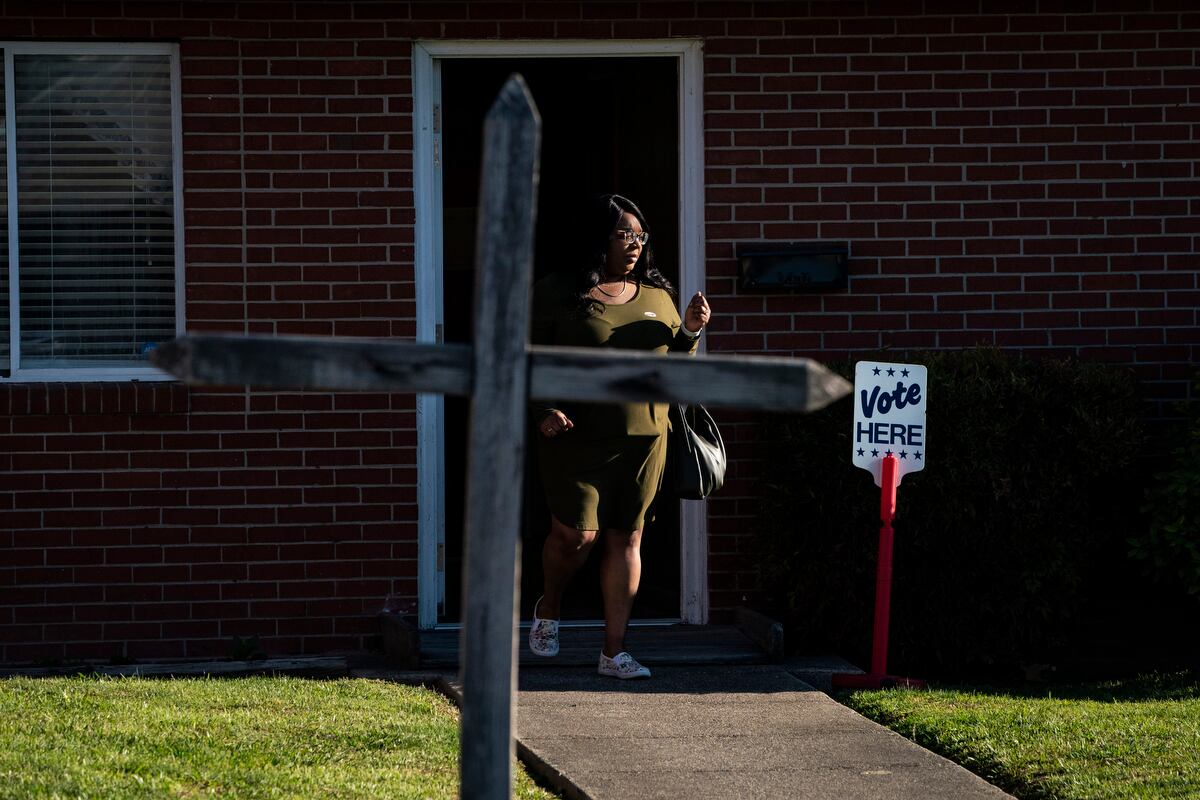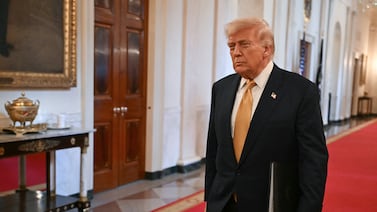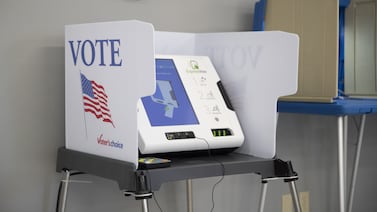A version of this post was originally distributed in Votebeat’s weekly newsletter. Sign up here.
North Carolina’s May primary was “one of the worst elections I’ve ever worked,” said Karen Hebb, the elections director in Henderson County. “It was worse than COVID.”
In addition to long conversations with skeptical voters bringing her misinformation they read on the Internet, Hebb said she and her staff were blindsided by the sheer number of election observers who wanted to watch voting during the primary. There were at least 20 from the Republican Party alone, she said, compared with five or six observers total in the past. “We’ve never had that before,” she said.
Hebb stresses she’s fine with having observers. But some of the people watching the primary were disruptive, endlessly questioning workers and demanding to approach tabulators to verify totals, she reported to state officials in a post-election survey.
And in one alarming case, Hebb said in an interview with Votebeat, an observer followed an election worker from a voting site to the elections office “to make sure that they actually brought the ballots.”
In the wake of the primary, Hebb is one of many local election officials nationwide worried about an onslaught of election observers. She called a special meeting with election workers to discuss the issues that came up during the primary.
Hebb is also soliciting questions from the public that she plans to address at an upcoming meeting at the Henderson County library, hoping that will resolve some concerns about election integrity. Hebb is hoping that she can convey accurate information about the election process and thus head off any potential disruptions from observers who don’t understand how it works. And she’s spoken with the sheriff, who she said will get involved if election workers are inappropriately followed again.
Henderson County, known for its apple orchards and nestled in the Blue Ridge mountains in the heavily touristed western part of the state, was one of more than a dozen counties to tell state election officials about problems with election observer conduct during the primary election. The issues documented in the state survey included reports that observers demanded to watch people vote, intimidated election workers, or improperly interacted with voters. The feedback from the county election officials prompted the state elections board to adopt new temporary rules for election observers on August 16.
Observers at the polls, typically appointed by political parties, are a longstanding tradition throughout the country. But the unfounded claims of fraud by former President Donald Trump and his allies are attracting a surge of new observers with unfounded concerns and misconceptions about election integrity. Election officials and advocates worry their zeal could cross the line into voter intimidation, disrupt election sites, or compromise the secrecy of the ballot.
Different states have different rules governing election observers, sometimes also known as poll watchers. The Republican Party and allied conservative groups have been training potential observers around the country, sometimes emphasizing unfounded suspicions about the integrity of the vote.
North Carolina is far from the only state wrestling with how to handle a rush of new election observers. In Michigan this month, officials ejected a GOP observer from a Detroit facility where they were counting primary ballots after he spent hours arguing about predetermined rules. Some Arizona election officials are now requiring poll observers to fill out forms detailing problems before they leave polling sites, a way to avoid unsupported allegations that surface after the fact.
For its part, the North Carolina State Board of Elections last week unanimously approved the temporary changes to the rules governing election observers. The changes were an attempt to clean up existing rules that the state board’s associate general counsel, Paul Cox, described as “not models of clarity.” The state’s Rules Review commission must still approve the changes.
The new rules more clearly spell out where observers are permitted to be. For example, the new rules specify that observers cannot be “so close to a tabulator, laptop, pollbook[,] or other official [voting] document” that they are able to view confidential voter information. They may not use doors restricted to election workers only, unless authorized by the polling place judge, but do not have to stand in line with voters to enter.
Multiple people spoke at public hearings in July and August about the proposed changes to the relatively obscure rules. Among them: Cleta Mitchell, a conservative election attorney who featured in Trump’s efforts to overturn the results of the 2020 election and has been spearheading conservative efforts to train election observers. Mitchell, who said she now resides in Pinehurst, NC, a nationally renowned golf destination, said the state board was improperly using the temporary rulemaking process “for the purpose of curbing the enthusiastic interest that many citizens of North Carolina have expressed in making sure that the elections conducted in our state are transparent and that they are following the law.”
The state board, which has three Democratic members and two Republicans, also received hundreds of public comments about the proposed changes, a sign of just how charged the issue of election observers is right now.
“At this time of increasing incivility and openly egregious attacks on our democracy and voting rights, it is more important than ever to establish some ground rules and expectations for a safe, secure, and non-threatening electoral process.” one email in favor read.
“Rules changes are the prerogative of the state legislature, not the Board of Elections,” wrote one commenter opposed to the change. “We need more observers present and greater transparency, not less.”
“I think part of this,” said Christopher Cooper, a political science professor at Western Carolina University who studies election administration, “is a direct reaction and response to what we saw with election observers not understanding their jobs, and part of this is reaction to the broader environment of radical politicization of the election process.”
Administrative adjustments, of course, are an imperfect tool when it comes to addressing the powerful national forces fueling skepticism about elections.
“I don’t expect it to depoliticize the election process with one temporary rule change, but they have to do something,” Cooper said.
💬 Let us know: We’re working to identify places that are adopting hand counting of ballots for the November elections. Is your county or city considering a move to hand counting? Please email tips@votebeat.org and tell us about it.
Back Then
President Truman founded the National Committee on Civil Rights in late 1946. The group ultimately produced a surprisingly honest account of the state of civil rights in America titled, “To Secure These Rights.” “The committee, Noah’s-ark like, counted among its members two African Americans, two women, two labor leaders, two businessmen and two southerners,” writes Alexander Keyssar, a historian of voting rights. One of the southerners was Frank P. Graham, the president of the University of North Carolina. The year after the publication of the committee’s report, Graham was called a communist during the country’s infamous “Red Scare” in the early 50s. He was labeled “a traitor to the South” for signing the report.
- Alaska held its first primary using ranked choice voting. Some candidates didn’t love it, but there were no large-scale administration issues reported. In Wyoming, which also held a primary, Trump-backed State Rep. Chuck Gray — who asserts the 2020 election was stolen — won the Republican nomination for secretary of state. Meanwhile, U.S. Rep. Liz Cheney — the vice-chair of the Jan. 6 Commission — lost her Republican primary race.
- The Maryland State Board of Elections voted this week to file an emergency petition in court seeking an earlier start to the counting of mail-in ballots in the state. The state currently prevents any processing until after Election Day. Maryland is the only state with such a requirement, and the board said in a statement it “could leave local, statewide, and even federal contests without certified results until late December 2022 or early January 2023.”
- Nye County, Nevada has moved to use hand-counted ballots, which the state cannot stop them from doing. So, reports the Nevada Current, the secretary of state is “attempting to provide some order to what election groups fear will be chaos” via regulations on the process. Nye County officials say they disagree with the recommendations. If approved, the measure will go into effect on Sept. 30.
In Other Voting News
Rightwing activist groups are rounding up sheriffs for the cause. “The Arizona-led groups together boast over 350 sheriffs as members nationwide” and have joined forces with Texas-based True the Vote to monitor elections for fraud, reports The Guardian.
- On Monday, Rudy Giuliani, former personal attorney to Donald Trump, was informed he “was a target in a wide-ranging criminal investigation into election interference in Georgia.” This typically means that prosecutors believe there is likely enough evidence to indict Giuliani, although an indictment is not guaranteed. Giuliani testified before a Fulton County grand jury on Wednesday.
- In a surprise to no one who reads this newsletter, social media companies are offering very little information about what they intend to do to prevent the spread of mis- and disinformation during the 2022 election.
Good News Of The Week
Mesa County, Colorado, might not be the first place you’d expect to hear good news lately, considering its clerk was indicted on allegations of assisting in a cyber-breach of the county’s voting system and then launched a Trump-supported bid for secretary of state. Yet the county’s election department is celebrating a success in the wake of the scandal.
The Colorado County Clerks Association has bestowed two election-service awards on Mesa employees this month, to Brandi Bantz, the county’s designated election official (since Clerk Tina Peters has been relieved of duty), and the county’s elections manager Stephanie Wenholz (who had nominated Brantz!). “It’s an honor to recognize both Brandi and Stephanie for their amazing work conducting elections on behalf of the citizens of Mesa County,” Matt Crane, executive director of the association, said in a statement. “While it’s normally our custom to have one award winner each year, the strength, courage and professionalism of both Brandi and Stephanie, in the face of international scrutiny and in the shadow of a disgraced election official who violated her oath of office and the public trust, deserves to be honored.”
A Chance to Get Involved
Votebeat is forming a Reader Advisory Board, and we’re looking for thoughtful, passionate members. This will be the most direct way to give us feedback on our journalism and share your ideas. Check out more on how it works and how to apply right here.
Carrie Levine is Votebeat’s story editor and is based in Washington, D.C. Contact Carrie at clevine@votebeat.org.






